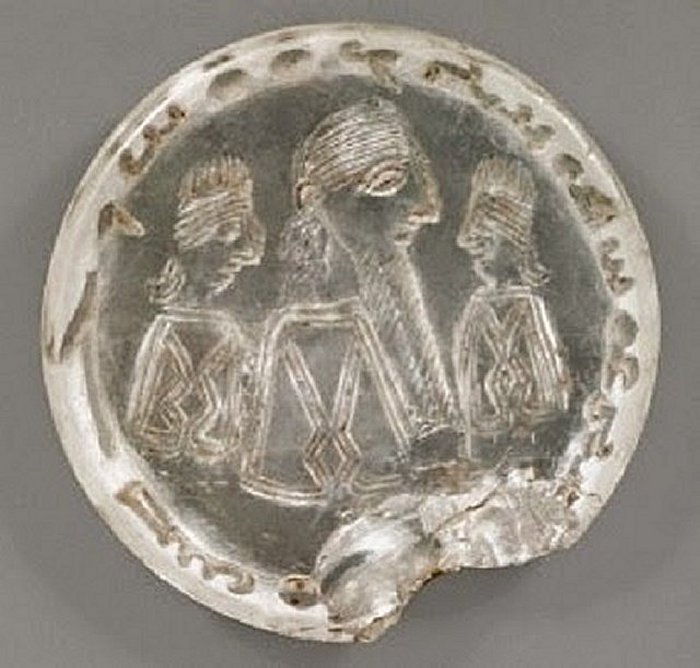Mani: Apostle Of Light And His Ancient Rock Crystal Seal
Ellen Lloyd - AncientPages.com - A major gnostic religion originating in the Sassanid era of Babylonia was founded by the Persian prophet Mani (216-277 CE).

Rock Crystal Sasanian Seal: Mani and two of the Elect priests. The inscription reads, "Mani, the Apostle of Jesus Christ". The seal once used by the prophet Mani to authenticate his writings and correspondence. It is housed in the National Library of France.
Mani, who in the past was considered by scholars to be a Christian heresy, intentionally created a universal church that incorporated Christian, Zoroastrian, and Buddhist concepts.
Today, his religion - Manichaeism - is accepted as an independent religion. His new religion would not simply replace the previous religions but instead represent the fulfillment of what the previous religions had promised but not been able to live up to.
Most of Mani's original writings have been lost, but numerous translations and fragmentary texts have survived and can provide invaluable historical insights.
Image source: National Library of France.
An ancient rock crystal seal once used by the prophet Mani to authenticate his writings and correspondence is now housed in the National Library of France. The artifact has been studied by Zsuzsanna Gulacsi, professor of Comparative Cultural Studies, to provide new interpretations and prepare the seal for further research.
She published her findings in the Bulletin of the Asia Institute.
Prophet Mani was the founder of a religion now called Manichaeism. He preached a universal philosophy that included elements of Zoroastrianism, Buddhism, Christianity, and Hinduism.
The seal is flat on one side and rounded on the other, with a recessed carving on one half, creating a positive image on the opposite side. Mani is flanked by two people, possibly disciples, and an inscription reading 'Mani, the apostle of Jesus Christ' forms the perimeter.
According to Gulacsi, Mani stood out among the religious leaders of the time because he wrote his doctrine, compared to Jesus, Mohammad, and the historical Buddha, who were not known to read or write.
He believed other religious leaders had their teachings distorted because they could not write themselves.
"Their disciples did not have the capacity of a prophet, whose clarity of religious insight was believed to surpass that of ordinary human beings," said Gulacsi, who believes that Mani wore his crystal seal as a pendant, a practice of that time.
"...his seven canonical works included the Treasure of Life, Living Gospel, Book of Giants, Book of Mysteries, Letters, Psalms and Prayers [all in Syriac Aramaic], and the Shabuhragân [in Persian]). Jesus, he said, came to the West, and after his death, his disciples wrote down his words.
Zoroaster came to Persia but did not write books, though his disciples remembered and wrote down his words after his death. And, when the Buddha came, he preached much wisdom and established churches, but he did not write anything, and, again, it was his disciples who wrote down his words after his death..." according to Judith Weingarten's blog.
The rock crystal is flat on one side and rounded on the other, with a recessed carving on one half, creating a positive image on the opposite side.
The Mani's seal is a unique surviving artifact about the size of a quarter; the thin quartz seal was likely once encased in gold to facilitate its use.
In 274, Mani died in prison after being persecuted for his religious teachings. His belongings were likely passed to his successor, but the crystal seal's fate is only known once it turned up in Paris in 1896, where it was purchased and housed in the gemstone section of the National Library of France.
Despite its historical significance, Mani's engraved crystal seal had escaped attention until recently.
Written by - Ellen Lloyd – AncientPages.com
Updated on December 17, 2023
Copyright © AncientPages.com All rights reserved. This material may not be published, broadcast, rewritten or redistributed in whole or part without the express written permission of AncientPages.com
More From Ancient Pages
-
 Has The Mystery Of Neanderthals’ Flower Burial At Shanidar Cave Been Solved?
Archaeology | Aug 31, 2023
Has The Mystery Of Neanderthals’ Flower Burial At Shanidar Cave Been Solved?
Archaeology | Aug 31, 2023 -
 Thousand-Year-Old Sarcophagus Discovered In Odense
News | Sep 28, 2015
Thousand-Year-Old Sarcophagus Discovered In Odense
News | Sep 28, 2015 -
 Great Flood Myth Told By Klallam People Of Washington’s Olympic Peninsula – Confirmed
Archaeology | May 17, 2019
Great Flood Myth Told By Klallam People Of Washington’s Olympic Peninsula – Confirmed
Archaeology | May 17, 2019 -
 Ancient Mystery Of The American Southwest – Unusual Skeletons And Mummies – Part 2
Civilizations | Jul 24, 2018
Ancient Mystery Of The American Southwest – Unusual Skeletons And Mummies – Part 2
Civilizations | Jul 24, 2018 -
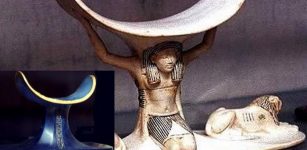 Why Did Ancient Egyptians Use Pillows Made Of Stone?
Ancient History Facts | Jun 18, 2018
Why Did Ancient Egyptians Use Pillows Made Of Stone?
Ancient History Facts | Jun 18, 2018 -
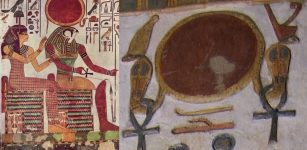 Eye Of Ra – Powerful Ancient Egyptian Symbol With Deep Meaning
Ancient Symbols | Jan 23, 2019
Eye Of Ra – Powerful Ancient Egyptian Symbol With Deep Meaning
Ancient Symbols | Jan 23, 2019 -
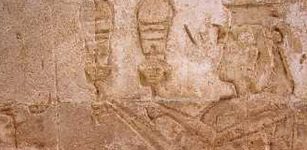 Female Pharaoh Twosret Was Exploited, Used And Almost Erased From History
Featured Stories | Apr 11, 2019
Female Pharaoh Twosret Was Exploited, Used And Almost Erased From History
Featured Stories | Apr 11, 2019 -
 Ruins Of 2,300-Year-Old City Of Jiaohe On The Silk Road
Civilizations | Aug 6, 2023
Ruins Of 2,300-Year-Old City Of Jiaohe On The Silk Road
Civilizations | Aug 6, 2023 -
 The Colored Skeletons Of 9000-Year-Old Çatalhöyük (Catalhoyuk), Turkey – New Examination
Archaeology | Mar 18, 2022
The Colored Skeletons Of 9000-Year-Old Çatalhöyük (Catalhoyuk), Turkey – New Examination
Archaeology | Mar 18, 2022 -
 Yasuke – The First Black Samurai Caused A Sensation In Japan
Featured Stories | Oct 25, 2019
Yasuke – The First Black Samurai Caused A Sensation In Japan
Featured Stories | Oct 25, 2019 -
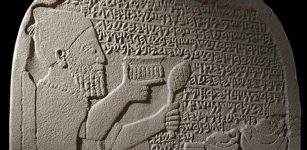 Ancient Kuttamuwa Stele And Iron Age Belief That Soul Lived In Funerary Slab
Featured Stories | Sep 10, 2016
Ancient Kuttamuwa Stele And Iron Age Belief That Soul Lived In Funerary Slab
Featured Stories | Sep 10, 2016 -
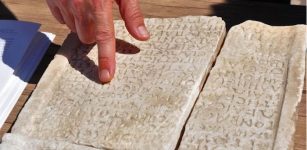 Mysterious 1,800-Year-Old Roman Marble Inscription Found In The Ancient City Of Aigai Deciphered
Archaeology | Oct 5, 2022
Mysterious 1,800-Year-Old Roman Marble Inscription Found In The Ancient City Of Aigai Deciphered
Archaeology | Oct 5, 2022 -
 10 Ancient Shipwrecks And Several Underwater Artifacts Found Around The Island Of Kasos
Archaeology | Mar 14, 2024
10 Ancient Shipwrecks And Several Underwater Artifacts Found Around The Island Of Kasos
Archaeology | Mar 14, 2024 -
 On This Day In History: Raid On The Medway Took Place – On June 19, 1667
News | Jun 19, 2016
On This Day In History: Raid On The Medway Took Place – On June 19, 1667
News | Jun 19, 2016 -
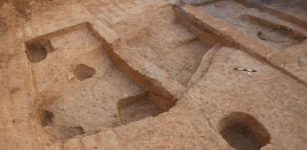 6,500-Year-Old Copper Workshop Unearthed In Negev Desert
Archaeology | Oct 6, 2020
6,500-Year-Old Copper Workshop Unearthed In Negev Desert
Archaeology | Oct 6, 2020 -
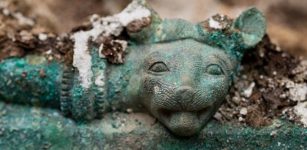 Tomb Of Celtic Prince Has Been Unearthed In France
Archaeology | Mar 5, 2015
Tomb Of Celtic Prince Has Been Unearthed In France
Archaeology | Mar 5, 2015 -
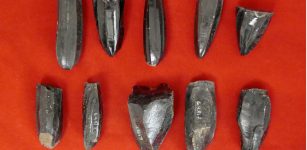 Mayas Utilized Market-Based Economics – New Study
Archaeology | Jan 6, 2023
Mayas Utilized Market-Based Economics – New Study
Archaeology | Jan 6, 2023 -
 Ancient Greeks Had Great Understanding Of Weather And Climate
Civilizations | Sep 7, 2015
Ancient Greeks Had Great Understanding Of Weather And Climate
Civilizations | Sep 7, 2015 -
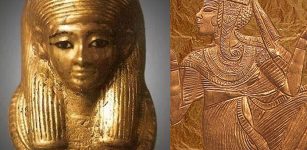 Mystery Of Dakhamunzu And The Zannanza Affair – Was Queen Ankhesenamun Hiding Her Identity?
Featured Stories | Feb 1, 2019
Mystery Of Dakhamunzu And The Zannanza Affair – Was Queen Ankhesenamun Hiding Her Identity?
Featured Stories | Feb 1, 2019 -
 Library Of Celsus: Beautiful Classic Monument In Ephesus That Stored 12,000 Scrolls
Civilizations | Nov 14, 2018
Library Of Celsus: Beautiful Classic Monument In Ephesus That Stored 12,000 Scrolls
Civilizations | Nov 14, 2018

